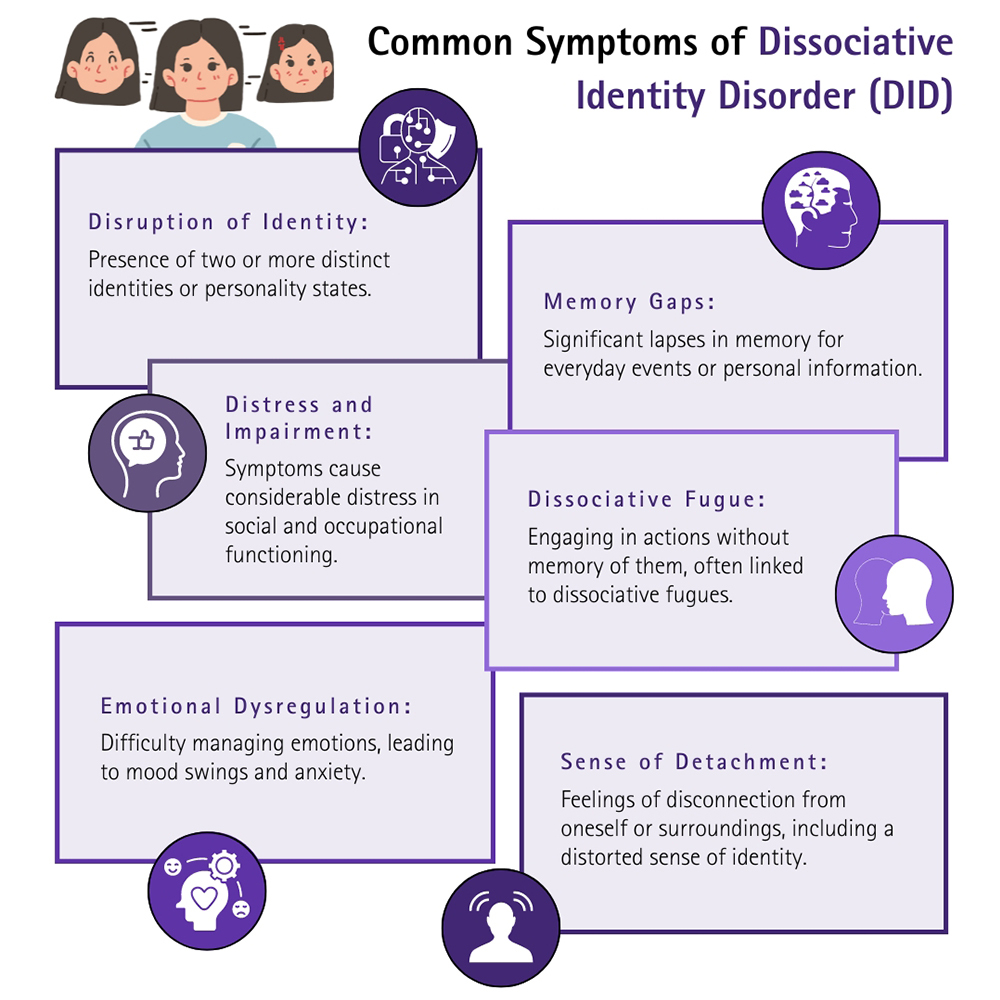
Understanding Dissociative Disorders
Dissociative disorders are characterized by disruptions in normal personal identity, memory, emotion, behavior, or perception.
Types of Dissociative Disorders
Types of dissociative disorders include:
- Dissociative identity disorder (DID): DID is a dissociative disorder, which is characterized by disruption of consciousness, memory, identity, emotion, perception, body representation, motor control, and behavior.
- Dissociative amnesia: This is the inability to recall important information about yourself that would be ordinarily easily remembered.
- Depersonalization/derealization disorder: Persistent feeling detached from reality or self.
If you believe you may be experiencing a dissociative disorder, the Trauma Therapy Center’s Liz Chelak has the knowledge and experience to help you navigate and treat dissociative disorders.
When you visit our Palm Beach, FL offices or attend a virtual session from home, you can expect trauma-informed therapy in a comfortable and supportive environment.
Call us or book appointment online.
(561) 363-7994Symptoms of DID
Symptoms of DID include:
- Disruption of identity with two or more distinct personalities
- Gaps in memory of everyday events
- Significant distress in social, occupational, and other areas of life
- People with DID often find evidence of dissociative fugues involving actions they do not remember. Often, DID is associated with traumatic abuse in childhood.
Losing time can be a frightening experience. Our therapists specializing in trauma therapy offer their understanding and skills.
With specialized training and a compassionate approach, we’ll work with you to heal from the past and build a brighter future.

Diagnosing
A therapist or doctor can diagnose DID. While there is no specific test for DID, your therapist can conduct an interview and assess your symptoms and medical history to diagnose DID.
To diagnose DID, you must have:
- Two or more distinct personality states
- Each personality, or alter, has its unique feelings, thoughts, memories, and behaviors
- Recurrent blackouts
- Symptoms are not better explained by substance use (substance abuse) or another mental health disorder
- DID is treated with the help of a therapist through individual and group therapy.
Trauma-informed therapy can help you address the underlying causes of DID, learn about your disorder, and learn to manage symptoms.
Our outpatient program offers comprehensive and specialized care for DID and dissociative disorders.
For more information about our counselors or to schedule an appointment with a therapist, call the therapy center.
(561) 363-7994Dissociative Disorder Treatment
It’s natural to feel unsure about what to expect when meeting with a dissociative identity disorder specialist. In your first session, your counselor may ask you some questions about your current everyday life, as well as your history. This is to get a better idea of your symptoms, triggers, and coping mechanisms.
In follow-up therapy sessions, you will work on the goals you set in your dissociation treatment plan. Remember, this is your therapy; you can work on whatever you wish. There is no right or wrong way to do therapy. Counseling is about identifying what benefits you the most and working towards those goals.
You may be concerned about talking about past traumatic memories in therapy. However, it is your therapist’s job to make sure you are safe from retraumatization that can come from re-telling your story. Your therapist will prioritize your safety and well-being throughout the process. Remember, therapy is designed to help you heal and improve your well-being.
Our Approach to Dissociative Disorder Therapy
At our center, we believe in a personalized approach to evidence-based therapies. Our experienced and compassionate counselors are here to help you navigate the challenges of your dissociative disorder and achieve lasting recovery.
Specialized Treatment Plans
We carefully assess each client’s needs and develop a personalized treatment plan incorporating evidence-based therapies, emotion regulation tools, and coping skills that work best for you, such as deep breathing, mindfulness, or specific dialectical behavior therapy (DBT) skills.
We aim to provide a comprehensive and supportive environment that fosters healing and resilience.
Your counselor will provide the information you need to decide on the best intervention for you, such as eye movement desensitization reprocessing (EMDR) or cognitive behavioral therapy (CBT).
Experienced Therapists
Liz Chelak, with a deep understanding of dissociative disorders, not only provides expert guidance but also creates a safe and supportive space where clients feel truly heard and understood. Her compassionate nature fosters a strong therapeutic bond, allowing effective collaboration and healing.
With a focus on trust and understanding, our Palm Beach therapists can help you feel empowered to heal.
Supportive Environment
At our center, your safety and confidentiality are our utmost priority. Our counselors create a nonjudgmental environment where each individual feels comfortable working on past traumatic experiences. We believe a supportive environment is essential for fostering healing and promoting personal growth and self-esteem.
Online Therapy or Virtual Consultations
Therapy Techniques
Evidence-based therapy for DID includes:
- Psychodynamic psychotherapy
- Trauma-focused cognitive behavioral therapy (TF-CBT)
- Dialectical behavior therapy (DBT)
- Eye movement desensitization reprocessing (EMDR)
- Internal family systems (IFS)
We use only evidence-based techniques that have been proven effective in treating dissociative disorders. This ensures that you receive safe treatment for lasting recovery.
People engaged in individual therapy for DID typically see improvement in a couple of months. Therapy for DID can be long-term, but it is important to maintain consistency with therapy for the best results.
Recovery
It is possible to fully recover from DID and live a full life. Many people must increase self-awareness and learn to manage the symptoms of DID for the rest of their lives. Learning appropriate coping strategies and processing past trauma with a therapist may help treat DID.
Here are some things you can do to support someone who has been diagnosed with DID:
- Educate yourself on DID
- Listen to the feelings and needs of your loved one
- Ask them what they need
- Be patient
You are not alone. There are resources available to help you support your loved one living with DID. Liz Chelak, LCSW, also recommends family members participate in family therapy with their loved ones.
Medication
While medication management is not used as the first line of treatment, a psychiatrist may prescribe medications for symptoms of DID, such as depression or PTSD symptoms. The medication works best in conjunction with therapy.
Some medications a DID client may be prescribed include:
- Fluoxetine (Prozac)
- Sertraline (Zoloft)
- Citalopram (Celexa)
- Risperidone (Risperdal)
- Olanzapine (Zyprexa)
- Quetiapine (Seroquel)
- Venlafaxine (Effexor XR)
- Duloxetine (Cymbalta)
There is no one-size-fits-all treatment for DID. Your doctor should work with you to identify the best medication for you.
Lifestyle Changes
Some lifestyle changes you can make to help improve your DID symptoms include:
- Establish a routine
- Create a comfortable home environment
- Maintain a healthy diet and sleep schedule
- Practice relaxation techniques
- Build a support system
- Avoid drugs and alcohol
You can talk to your therapist about making sustainable lifestyle changes that work for you. Together, you and your therapist will create a treatment plan that suits your needs and lifestyle.
Benefits of Choosing Our Center
When looking for a therapist for DID, you want to find someone who can help you treat the underlying cause of your symptoms. A trauma therapist will help you address the root of your DID by processing your trauma, challenging your negative thoughts, and developing coping skills to help you manage your symptoms.
Our center has a proven track record of successfully treating dissociative disorders and co-occurring disorders. Many of our clients have reported positive outcomes and improved quality of life after completing therapy at our center.
Schedule a free consultation to learn more about our approach and how it can benefit you.
Through counseling at the Trauma Therapy Center of the Palm Beaches, FL, you can:
- Reduce dissociative disorder symptoms
- Improve your relationships
- Learn effective coping skills
- Decrease the impact of past traumas
Call us today for a free 15-minute consultation at 561-363-7994 to find out more about treatment centers for dissociation.
At the Trauma Therapy Center, we are committed to providing effective dissociative identity disorder outpatient treatment. Our team of dissociative identity disorder counselors offers a safe, confidential, and supportive environment in which to acquire the tools to improve overall well-being. Take the first step toward healing today; reach out to us for a free consultation or to book an appointment.
Additional Resources:
Dissociative Disorders Foundation (DDF)
The International Society for the Study of Trauma and Dissociation (ISSTD):
National Alliance on Mental Illness (NAMI)
Sources:
Dissociative Identity Disorder: What You Need To Know

